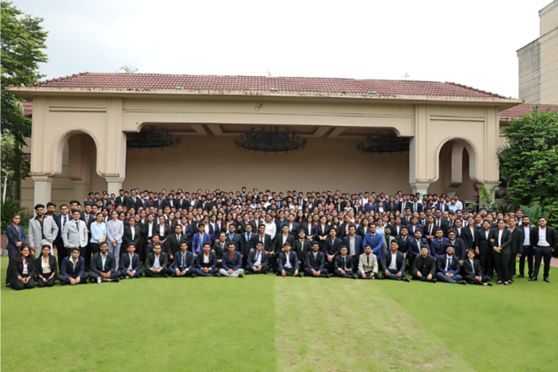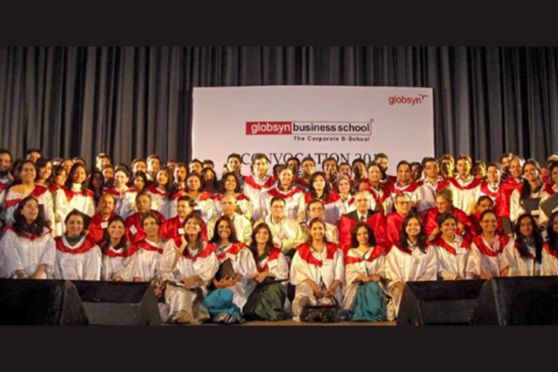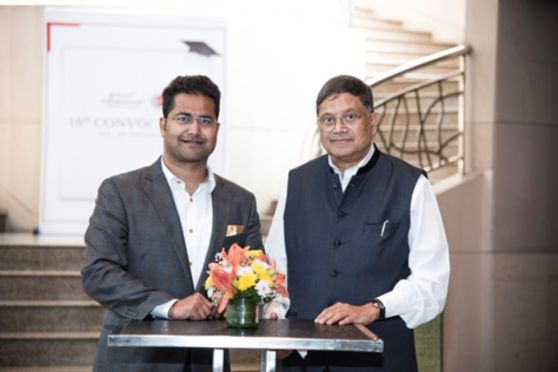The Legacy of GBS - Relevance of Universal Human Values in today’s Corporate World


Globsyn has gained recognition for its numerous pioneering achievements over the years, including the establishment of the first Software Finishing School, the introduction of the first corporate B-School, the development of the first intelligent buildings in India, and various other groundbreaking innovations. Under the expert guidance of its visionary founder, Bikram Dasgupta, Globsyn successfully integrated technology and management education, giving rise to the inception of Globsyn Business School (referred to affectionately as GBS by its alumni).
Operated by the Dasgupta Family and led by the Legacy Team, GBS is renowned not only for its strong industry connections but also for its leading position in fusing technology and innovative teaching methods with management education to enhance the educational experiences of its students. As articulated by Bikram Dasgupta, Founder and Chairman of the Globsyn Group, “The founding vision of Globsyn Business School, two decades ago, was to establish a knowledge-driven society that would empower the youth of India through technology-enabled management education. Our education edifice was designed in such a way that it nurtures young minds into compassionate and socially responsible managers, who will be upholding universal human values even in this AI-dominated world of the present. At Globsyn Business School what we have always tried to inculcate in our students are these values, enabling them to believe that ordinary people can do extraordinary things.”

When it comes to postgraduate management education today, Globsyn Business School has been a center of excellence. 2023 marks 21 years of the B-School. It was on this occasion that Rahul Dasgupta, Director & Trustee, GBS, spoke on several topics including the curriculum, infrastructure, and placements.
Having studied and worked in the U.S. Rahul wanted to implement his learnings and best practices from the West in the academic arena of the East. Now, with him at the helm of administration in the Business School, GBS is transforming rapidly in this desired path.

Curriculum
Highlighting the curriculum followed in the institution, Rahul said, “The role of the industry is much beyond placement in an academic institution. When we change our curriculum, the industry is heavily involved. We take a lot of feedback from them. GBS runs a programme called ‘The Boardroom Simulation Activity’ where MBA students of the institution are tasked to solve real-world problems of the corporate sector.” Speaking on this, he said, “When you have a corporate being involved with you on live projects like 'The Boardroom', they skill-up students in a way that they can recruit them. A by-product of this initiative is that we have seen higher and better placements.” He further explained, “I think we’ve become more integrated with the industry. There is an active participation of the corporates in our internships and the live projects we conduct.”
Rahul spoke about the cons of the so-called industry-ready curriculum and what could be done instead. “The concept of an industry-ready curriculum is now obsolete. GBS doesn’t believe in developing an industry-ready curriculum. The industry is rapidly changing. By the time a student completes a programme of 15 or 18 months, the industry has already transformed. So the only way out is to shape the students into lifelong learners”, he added.
Infrastructure
GBS boasts of a fantastic infrastructure. Rahul said, “Our academic block is built on two acres of land, where we teach only postgraduate management programmes. There is another six acres of land behind this. We have 22 classrooms in total. Now, if you do the math, it can be easily understood how luxurious the environment is for the students.” “They like to spend time on the campus”, he added.
Alumni
GBS prides itself on having a big alumni base. They actively participate in mentorship programmes and even come back to the institution when required. Also, there is a free-format learning program available. Rahul spoke elaborately about the alumni academic programme at GBS. He said, “Once you’re an alumnus of the groups in the Business School, you can come back every year for the rest of your life and do a credit programme at no additional format. This free-format learning programme attracts a lot of alumni to come back and continue learning. This innovative system has resulted in bettering the number of enrolments. Many graduates of GBS are currently working in senior positions in various organizations. Some of them are also in the Governing Council and Academic Council. They come back to their institute to recruit the freshers. This helps build a deeper connection between the institution and the industry and helps brand Globsyn Business School grow.”
Placement
Speaking of placements, Rahul said, "At Globsyn Business School, our primary emphasis is not on placement alone. Those who solely prioritize placement are concerned with securing job opportunities for students, but our main focus is on nurturing them into more effective learners. Our approach involves continuous efforts to engage with corporate entities over the course of two years, so that we can understand better what they will be expecting from our students. We then use this feedback to refine and enhance various aspects of our programmes. This ongoing process enables our students with the skills and knowledge required to thrive in this ever-changing job market, ensuring that they remain ‘industry-relevant’ regardless of market fluctuations by the time they graduate."
Countering Plagiarism
Rahul also spoke about countering plagiarism. He said, “One of the areas we are heavily investing in this year is plagiarism. We believe that a lot of universities do not do enough work in this sector. We strongly believe that more focus is needed on ethics and governance. A culture based on ethics and values needs to be built, so that students not only flourish in their academic achievements but also become better human beings. The message is loud and clear— I think we have a massive task at hand.”
Defining the NEP 2020 as a positive change, Rahul emphasized the importance of collaboration. He said, “I think the National Education Policy is a very positive change. We all need to work collectively and there should be partnerships across the board. Right now, the main challenge for us is how to customize learning for every learner. Any institution that cracks this model is going to be a differentiator, and I think the only way to do this is by focusing more on research and collaborations. I encourage universities and business schools to partner with each other and solve this problem.”